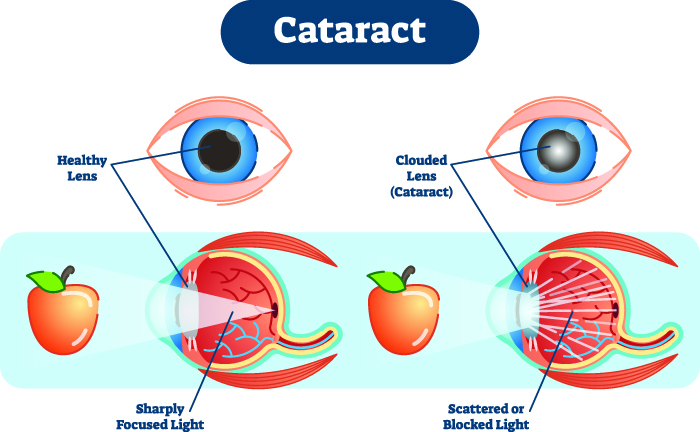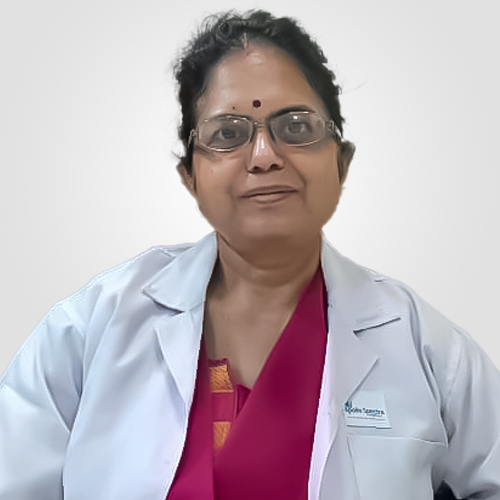Cataract Surgery in Chembur, Mumbai
Globally, cataract is the leading cause of treatable blindness. It usually develops in the 50s. Seek medical assistance if you observe any symptoms such as blurry vision and nearsightedness.

What do we need to know about cataract?
A cataract is an eye disease in which the eye lens becomes opaque. It may lead to a blurred vision, something similar to looking out of a foggy window.
Though cataracts are age-related, cataract doctors in Mumbai recommend regular eye examination to eliminate the possibilities of the disease.
You can also visit an ophthalmology hospital near you.
What are the types of cataract?
- Nuclear cataract - It develops in the nucleus (center of the lens) and turns it yellow/brown.
- Cortical cataract - It looks like a wedge and is formed on the outer edge of the nucleus.
- Posterior capsular cataract - It affects the back of the lens and progresses faster than other types.
- Congenital cataract - This is less common. It is present at birth or forms during the baby's first year. It might be genetic or associated with intrauterine infection.
What are the symptoms of cataracts?
Cataracts usually develop slowly and do not interfere with your eyesight initially. However, some of the symptoms that you might notice include:
- Blurred vision
- Fading/yellowing of colors
- Trouble with night vision
- Increased sensitivity to glare from oncoming headlights (while driving)
- Double vision in the affected lens
- Need for brighter light for reading and similar activities
- Seeing halos around lights
- Frequent changes in eyeglasses or contact lenses prescription
- Nearsightedness, an eye condition in which you can see the objects nearer to you clearly, but the distant ones seem blurry
What causes cataracts?
Our eye lens comprises water and protein. The protein is arranged in such a way that when light passes through them, it forms a clear image of the object on the retina. However, as we age, this protein may clump together and cloud the lens, forming a cataract.
Apart from the advancing age factor, there are various other underlying causes of cataracts which include:
- Diabetes mellitus (diabetes)
- Unprotected and prolonged exposure to UV radiations
- Smoking, alcohol
- Trauma
- Radiation therapy
- Long-term use of steroids or other medication
When should you see a doctor?
If you observe any of the symptoms mentioned above, you should visit a cataract doctor in Chembur or Mumbai for consultation.
You can request an appointment at Apollo Spectra Hospitals, Chembur, Mumbai.
Call 1860 500 2244 to book an appointment.
How is cataract diagnosed?
For diagnosis, cataract doctors in Chembur review your medical history and perform a comprehensive eye examination which may include:
- Visual activity test: The doctor uses a Snellen chart to determine your vision.
- Tonometry test: This is the most common test in which the doctor tests your eye pressure using a painless puff of air to flatten your cornea.
- Retinal exam: In this, the doctor puts drops in your eyes to make your pupils wide (dilated), which makes it easier to diagnose the optic nerve and retina for any damage.
How are cataracts treated?
The recommended treatment for cataracts is surgery. However, we strongly recommend medical consultation before opting for surgery.
- Small incision cataract surgery - This involves making a small incision on the side of the cornea. A probe that emits ultrasound waves is inserted into the eye to suction out the lens in pieces. This process is called phacoemulsification.
- Extracapsular surgery - This involves making a larger incision on the cornea so that the lens can be removed in one piece.
Cataract surgeries are safe and have a high success rate.
How are cataracts prevented?
Cataract doctors in Mumbai suggest the following tips to prevent cataracts:
- Wear sunglasses to protect your eyes from UV rays
- Maintain a healthy weight
- Keep diabetes in check
- Stop smoking/drinking
- Eat fruits and vegetables rich in antioxidants
- Go for regular eye check-up
Conclusion
Cataract disrupts your normal eye functioning by clouding your lens. Different types of cataracts show varying symptoms. Though surgery is the most effective option in cataract treatment, sometimes taking some other measures may help you avoid incisions. Consult doctors to get a headstart on diagnosis and treatment.
Certain risk factors include heavy smoking, excess alcohol, diabetes, high blood pressure, previous eye injuries, exposure to radiation from X-rays and cancer treatments.
Yes, if not treated on time.
No, cataracts cannot grow back. However, there are slight chances of infection or bleeding in the eye. But these can be managed with proper care.
Symptoms
Our Doctors
DR. ASTHA JAIN
MBBS, MS...
| Experience | : | 4 Yeras Experience |
|---|---|---|
| Speciality | : | Ophthalmology... | Location | : | Chembur |
| Timings | : | Mon - Fri : 5:00 PM ... |
DR. NEETA SHARMA
MBBS, DO (Ophthal), ...
| Experience | : | 31 Yeras Experience |
|---|---|---|
| Speciality | : | Ophthalmology... | Location | : | Chembur |
| Timings | : | Thur, Fri : 10:00 AM... |
DR. NUSRAT BUKHARI
MBBS, DOMS, Fellowsh...
| Experience | : | 12 Yeras Experience |
|---|---|---|
| Speciality | : | Ophthalmology... | Location | : | Tardeo |
| Timings | : | Mon - Fri : 9:00 AM ... |
DR. PALLAVI BIPTE
MBBS, MS (Ophthalmol...
| Experience | : | 21 Yeras Experience |
|---|---|---|
| Speciality | : | Ophthalmology... | Location | : | Chembur |
| Timings | : | Mon - Wed, Fri & Sat... |
DR. PARTHO BAKSHI
MBBS, DOMS, DNB (Oph...
| Experience | : | 19 Yeras Experience |
|---|---|---|
| Speciality | : | Ophthalmology... | Location | : | Chembur |
| Timings | : | Mon - Fri : 11:00 AM... |
Treatments
Our Top Specialities
NOTICE BOARD
CONTACT US
CONTACT US
 Book Appointment
Book Appointment







.svg)
.svg)
.svg)
.svg)








